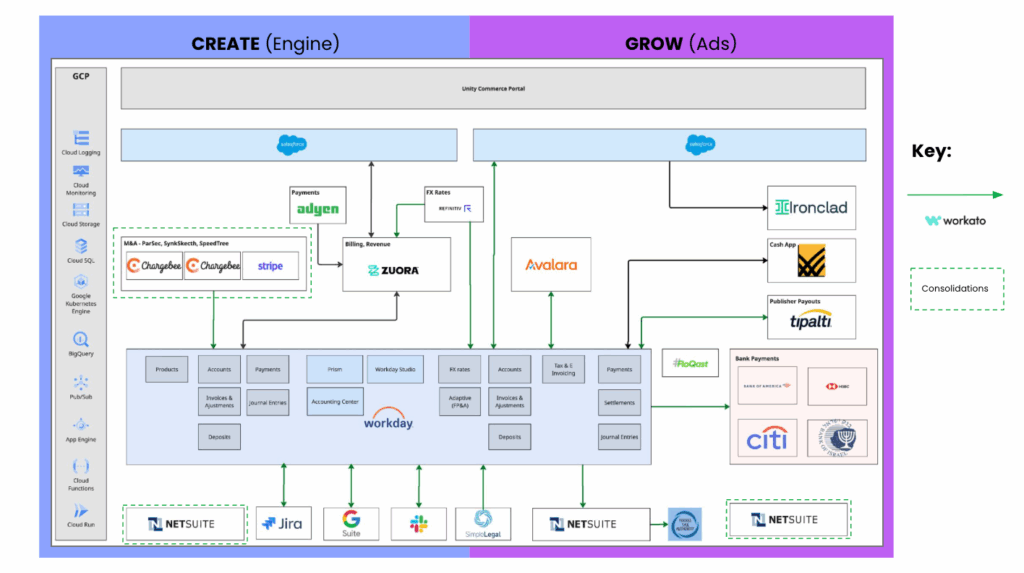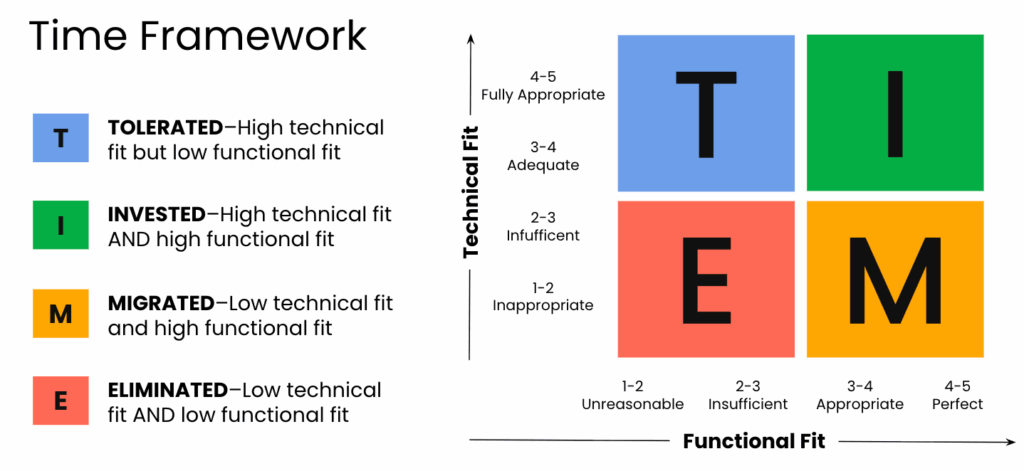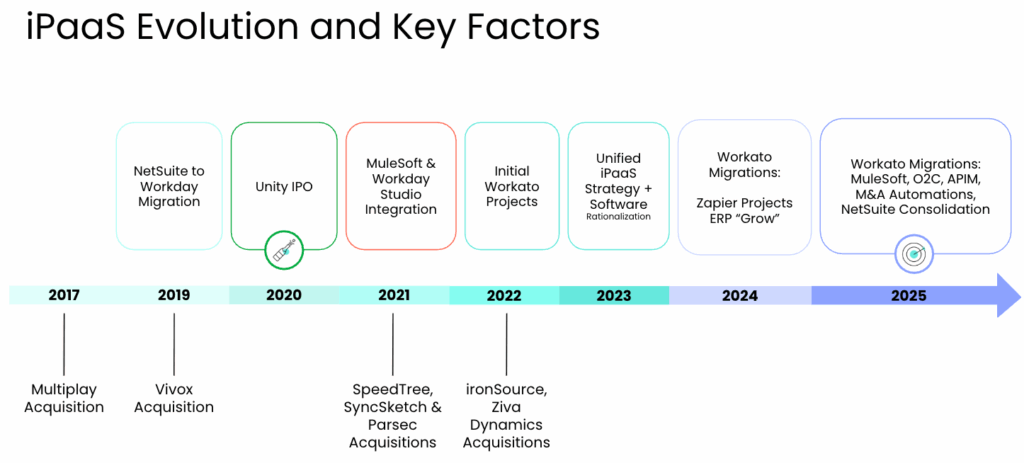Unity is one of the world’s leading platforms for creating and growing games and interactive experiences across mobile, PC, console, and extended reality (XR). Since its founding in 2004, the company has expanded to more than 5,000 employees and completed over 25 company acquisitions. This rapid growth brought incredible opportunities, but along with the revenue opportunities afforded by their acquisition strategy also came operational complexity across the many overlapping business systems they inherited from each acquired company. As a result, Unity was supporting more than 900 enterprise applications. Duplicate ERP and billing systems slowed down finance processes, and fragmented data created high expenses and inefficiencies across procurement, IT, and operations.
At the core of Unity’s transformation were Anshu Mishra, Director of Enterprise Technology, and Neetakshi Sharma, Senior Integration Architect—two leaders who guided the company’s migration to Workato and spearheaded its enterprise modernization journey. Together, they reimagined Unity’s integration strategy, consolidating hundreds of systems into a single, unified platform. Earlier this year, they took the stage at World of Workato World of Workato to share their story.
“As Unity scaled, we realized we weren’t just building great games—we were managing duplicate systems, redundant integrations, and rising costs,” said Anshu. “To unlock speed and efficiency, we had to rethink our integration strategy.”
The results of the transformation were immediate and measurable. In a short timeframe, Unity was able to save $19 million and counting through app rationalization. They consolidated 236 apps so far, and replaced their legacy integration tools with Workato, saving $441K in iPaaS Total Cost of Ownership.
“Workato gave us the ability to modernize quickly,” Anshu noted. “It wasn’t just about replacing tools—it was about building a platform for the future where automation, data quality, and AI could scale together.”
“The ROI spoke for itself,” said Neetakshi. “In less than a year, we were saving millions while improving data quality and compliance. Most importantly, employees could focus on innovation instead of repetitive work.”
The below diagram shows the end state of how Unity consolidated their financial and operational systems across both Create (Engine business) and Grow (Ads business). Under Create, acquisitions like Parsec, SyncSketch, and SpeedTree each came with their own billing tools—Chargebee, Stripe, and others—all of which were unified into Workday, orchestrated by Workato.

On the Grow side, the ads business used Zuora for billing, Avalara for tax, Tipalti for publisher payouts, and multiple banking systems. These too were integrated into Workday, with Workato serving as the orchestration layer.
Workday sits at the center—managing invoices, invoice adjustments, journal entries, deposits, UA transfers, and payments for both customers and suppliers, along with tax—supported by Workday Studio, Prism, and Adaptive FP&A for reporting and planning. Workato ensures end-to-end orchestration with idempotency, retries, audit trails, and seamless connections to tools like Slack, Jira, Google Workspace, and SimpleLegal for approvals and ticketing.
The entire infrastructure runs on Google Cloud, which enables governance, compliance, and scalability across two very different business models. The result: faster cycle times, cleaner data, and a unified financial view across Unity’s global operations. Previously, Unity relied heavily on MuleSoft and Zapier, along with a patchwork of custom-built integrations, to connect its growing ecosystem of applications. As the company scaled, maintaining these platforms became increasingly costly and complex. This architecture marks Unity’s shift from fragmented systems to a modern, orchestration backbone powered by Workato.
The Challenge – Application Sprawl and Rising Costs
The rapid pace of acquisitions left Unity with overlapping enterprise systems and redundant instances of critical applications. Finance teams faced slow, manual processes, particularly in areas like invoice handling and payments, while IT teams carried the burden of maintaining redundant integration platforms, including MuleSoft, Zapier, and custom-built tools. Costs escalated quickly, while employees across finance, procurement, and IT found themselves spending more time reconciling systems and answering repetitive questions than driving strategy.
“With over 900 applications, every new acquisition added complexity,” explained Neetakshi. “Finance, procurement, and IT were spending time reconciling data instead of driving strategy. We needed to simplify.” In 2024, the organization launched a company-wide Software Rationalization Program to streamline its application landscape and reduce the burden of integration sprawl.
Cutting Through the Chaos – One App at a Time
To bring order to the sprawl, Unity turned to the TIME Framework—Tolerate, Invest, Migrate, or Eliminate. Each application was evaluated for its technical and functional fit, with decisions driven by both business impact and scalability. Applications that failed to meet the mark were retired, while others were consolidated under stronger, more strategic systems.
Through this structured approach, Unity eliminated 236 applications and reduced software costs by nearly 30 percent. “The framework helped us move fast,” said Anshu. “We weren’t just looking at cutting costs—we were evaluating what really drives value and scalability for the future.”

At the heart of Unity’s transformation was a bold decision: to consolidate all integrations and automations on a single, unified platform. After assessing its legacy stack, Unity selected Workato as its enterprise orchestration platform, migrating off MuleSoft, Zapier, and other legacy tools.
Workato became the connective tissue for Unity’s most critical workflows and powered automation across Order-to-Cash, Accounts Payable, Accounts Receivable, Publisher Payouts, Intercompany Transfers, and FX Rate Syncs — while also driving large-scale ERP consolidations. With a unified iPaaS strategy, integrations became easier to manage, processes that once required days of manual effort were automated end-to-end, and data quality and visibility improved across the enterprise.

Business Impact – $4M Annual Value, 52,000 Hours Saved, 8X ROI
Unity realized over $4.06 million in annual business value. More than $2.1 million came from effort savings through automation of payment processes, FX rate synchronization, and invoice handling reduction. License optimization and connector retirements contributed another $944K in value, while cascading benefits such as cleaner data, faster cycle times, and improved compliance added nearly $1 million more.
The broader impact was equally striking. By retiring redundant integration platforms, Unity achieved $19 million in total cost of ownership savings, freed up 52,000 hours of employee time annually, and delivered an 8X return on investment. This level of efficiency and value wouldn’t have been possible without beginning the migration from MuleSoft and Zapier to Workato, and in the long term will consolidate Unity’s integrations into a single, intelligent platform. Streamlining their integrations not only reduced costs but also unlocked new agility and enabled teams to innovate faster and scale with confidence.
What’s Next – Agentic Vendor Onboarding
Having built a strong orchestration backbone, Unity is now looking ahead to the next phase of its journey: agentic AI. The company is piloting Workato Genies to transform procurement and vendor onboarding. With intelligent document processing, compliance checks, and automated approvals, Unity is building a vendor onboarding experience that is both seamless for business partners and orchestrated across finance, procurement, and security teams.
“Agentic AI is where the future lies,” Anshu shared. “With Workato, we’re building a vendor onboarding portal that doesn’t just process requests—it learns, adapts, and orchestrates across teams. That’s how we’ll scale to the next level.” With Workato, Unity is not only saving millions of dollars and tens of thousands of hours, but also building a foundation where intelligent agents act as digital teammates. What began as a mission to clean up 900 overlapping systems has evolved into a platform for enterprise intelligence. By consolidating and modernizing its integrations with Workato, Unity didn’t just save $19 million—it built a foundation for innovation, agility, and scale.
Unity’s story is a reminder that growth doesn’t have to come with complexity. With the right platform and a bold vision, even the most intricate systems can evolve into an engine for efficiency, intelligence, and speed.
